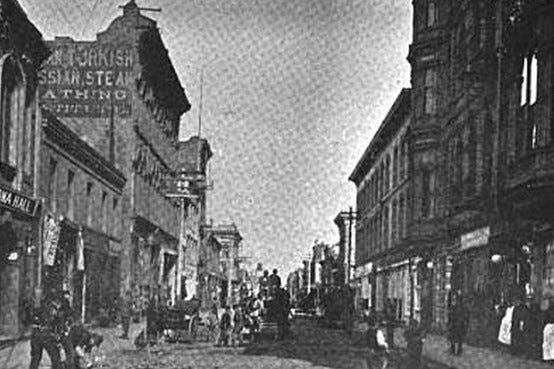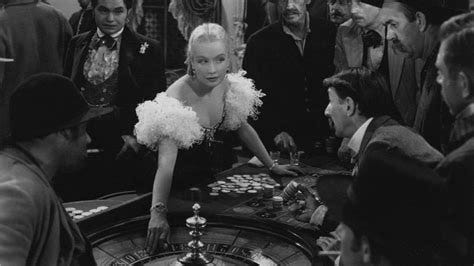1860: Barbary Coast, San Francisco, California
Mary Ellen Pleasant, Lisette Flohr
Read After the Gold Rush from the beginning:
So I had my contacts. I had my laundries. I had my catering jobs. I had my identities. I had myself my own growing staff of domestics. I was setting up a stable of prominent men who had no idea they were my stable: Latham. The Woodworth brothers. Ralston.
The Ralstons lived a few doors down from the Lathams, and Latham and Sophie and Ralston and Lizzie often entertained together. In no time the Ralstons were hiring me for their parties, too.
Now that Latham was Senator, the Lathams were gone to Washington—but the Woodworths, Selim and Frederick, snapped me up to manage their “bachelor house.” It was a typical arrangement: lodging being at a premium, a prospering business provided a boarding house for its employees. Along with the Woodworths, there were eight bachelor agents of the Case Heiser Commission House living there. I furnished the place, decorated it, cooked for ‘em. I hired my people to clean for them, sent their laundry out to my own business for washing.
But I was always there at dinner. The dining table was my personal office. I joked with the men and mothered them, with a bit of unmotherly edge. I poured them fine wines and lit them the best cigars I could lay hands on. And I heard their business deals and investments. I took notes in my head.
I heard everything they did, everything they wanted.
And under that, what they needed.
And that was women.
Those days, San Francisco was five men to every woman.
Oh, they had the parlor houses, and they had the saloons with the pretty waiter girls, and the cribs. A man could hire all kinds of women, for any kind of depravity, at any kind of price.
But what they needed—was wives.
Women needed husbands, too, for different reasons. Men made sure of that. Women can’t vote, can’t work—if they do work they get pennies on the dollar. A husband was often the only choice for simple damn survival.
These men, I’d been studying them. I saw what they wanted, how they wanted it.
It was time for me to build another business. And I knew where I had to go to start building it.
The petty thief, the house-burglar, the tramp, the whore-monger, lewd women, cut-throats, murderers, all are found here. Dance-halls and concert saloons, where blear-eyed men and faded women drink vile liquor, smoke offensive tobacco, engage in vulgar conduct, sing obscene songs, and say and do everything to heap on themselves more degradation, are numerous. Low gambling houses, filled with riot-loving rowdies in all stages of intoxication are there. Opium dens, where heathen Chinese and Godforsaken men and women are sprawled in miscellaneous confusion, disgustingly drowsy or completely overcome, are there. Licentiousness, debauchery, pollution, loathsome disease, insanity from dissipation, misery, poverty, wealth, profanity, blasphemy, and death are there.
- Benjamin Estelle Lloyd, Lights and Shades of San Francisco
I walked on Pacific Street, through the Barbary Coast. Past the melodeons and the dance halls, the saloons and the deadfalls.
Tonight I wasn’t passing. Tonight I was as dark as the sky. Mrs. Ellen Smith wouldn’t set foot in this neighborhood. Even the police were afraid to walk alone here. But I walked these streets often enough these days. Fishing.
Anyone bothered me, I had my knife.
I walked, and I looked over the women, just like any customer.
There was always a lot of talk about how in the early days of San Francisco the women were so rare that the prostitutes got the highest respect. That the men stood when the “fair but frail” walked into a room and stepped aside when they walked down the street. That the soiled doves attended the theater and were granted every courtesy. That prostitution was the easiest money there was.
And if you believe that, I got some silver stock to sell you.
You go try being fucked by strangers ten or twelve times a night and then come tell me it’s easy money.
Later, people who wanted to destroy me would call me a madam, a procurer. That’s not what I did. In New Orleans these things are understood. In New Orleans, things between men and women are practical.
Young Southern men couldn’t marry well until they’d acquired somewhat of a fortune. But no one expected them to wait that long to satisfy the needs of the flesh. Savvy mothers of color realized they could make the best life they could for their daughters by demanding more.
It evolved into a system called La Plaçage: The Placement. The left-handed marriage.
Well, here I was in a brand-new city, where everyone was rewriting the rules. I figured I could start placing white women.
Good for them, good for the men, good for me.
I went down into those saloons and deadfalls and looked for the ones who wanted out.
That’s wrong, of course. All of them wanted out.
I looked for the ones who wanted out bad enough.
Lisette, she was one.
I found her in a dance hall. Better than a deadfall or crib. But not much. Drugging customers and picking pockets was the best part of it. But she held her head up, and there was something almost elegant in the way she carried herself.
I sat at the bar and watched her working that night. Doing those moves they called dancing on the floor. Pushing champagne on the customers at ten dollars a bottle. And then every half hour or so, a break to take a man upstairs. And another.And another.
All night long. Every night of the year. It’s what they did, the pretty waiter girls. Until they died of one or more of the “Four Loathsome Diseases” or killed themselves with drugs or with a knife.
When she knocked off I followed her out, to an all-night drugstore on Grant Street where anyone could get cocaine or morphine for just two or three times the price of a beer.
She didn’t even wait to get home. She went down by the wharf and downed the vial. I waited till she was half passed out and puking, then I stepped up and held her hair while she retched into the street.
After a time I handed her a handkerchief. “Done now?”
She looked up at me with bleary eyes, wiped her mouth sullenly. “Who are you?”
“I’m the answer to your prayers.”
She snorted. “My prayers, huh. You don’t say.”
She sounded like she’d forgotten the meaning of the word, So I used a word I knew she’d understand. “You want to be rich? I can make you rich.”
Her eyes got clearer, and she studied me under the haze of the lamplight. She knew I was dead serious.
“How?”
“You want to be rich,” I waited, challenging her. It was a while before she let herself answer.
“Yes.”
I made my voice sharp. “You talk to me, you say ‘Yes, ma’am.’”
She was silent, seething… but listening.
“You willing to work? Because if you aren’t, I’ll throw you back into this sewer, that quick. There’s a thousand like you I could pick up tomorrow.”
She didn’t even try to lie. I knew what her life was and she knew I knew.
“So I ask you again. You willing to work?”
She finally looked at me straight on. “Yes, ma’am.”
“Better. From now on you mind me like a good Southern girl minds her mam.”
“I’m not Southern.”
“You’re whatever I tell you it’s useful for you to be. You want a big house on Rincon Hill? You want people looking after you?”
I saw her go still.
“Yes, ma’am.”
“You want children who will never know hardship like what you’ve known?”
Her face softened, and so did her voice. “Yes, ma’am.”
“All right, then.” I reached down and picked up the morphine bottle. “First off, this junk got to go.”
#####
Subscribe for notifications of new sections:
Read After the Gold Rush from the beginning:







New city. New rules. New opportunities.